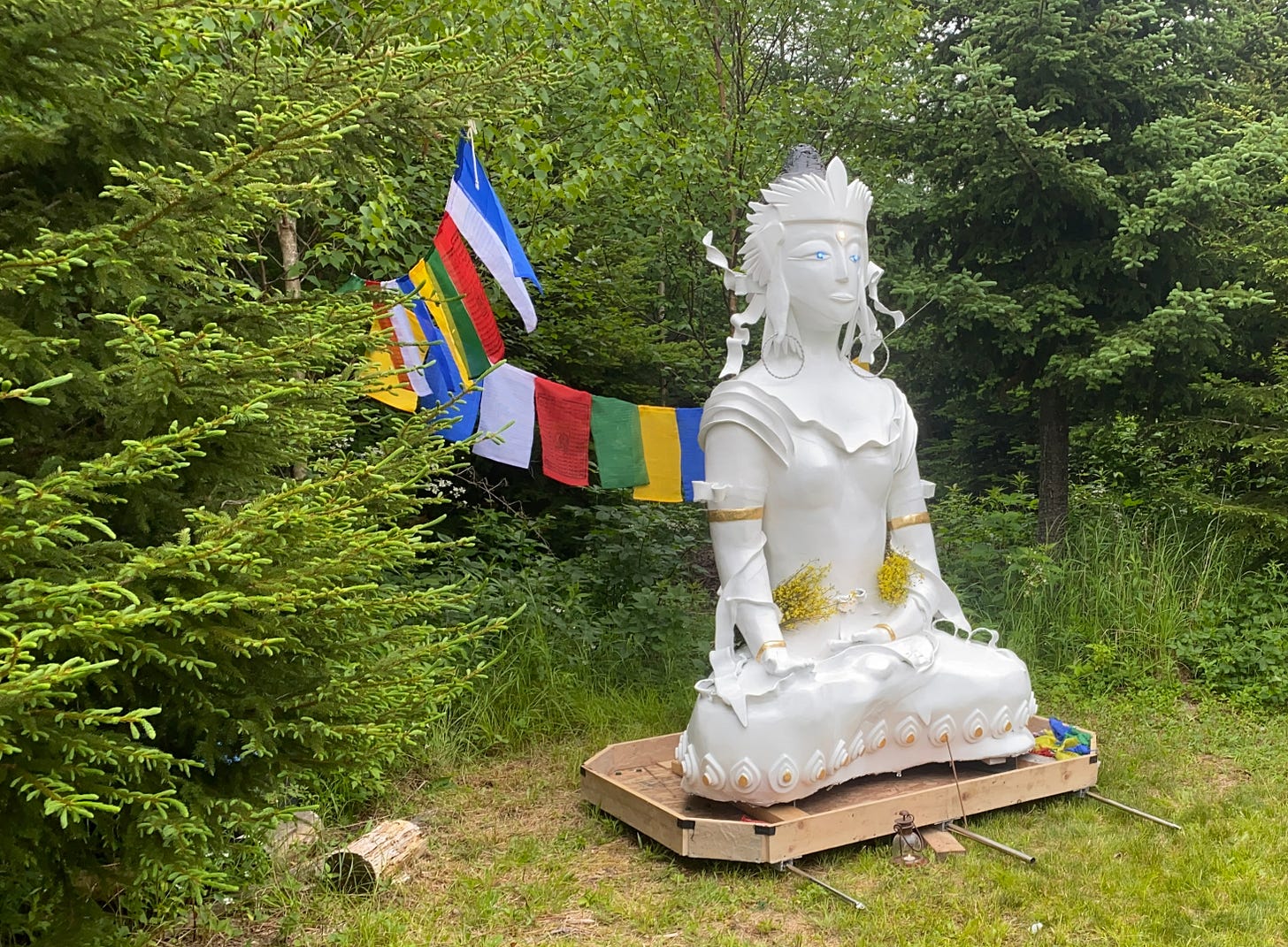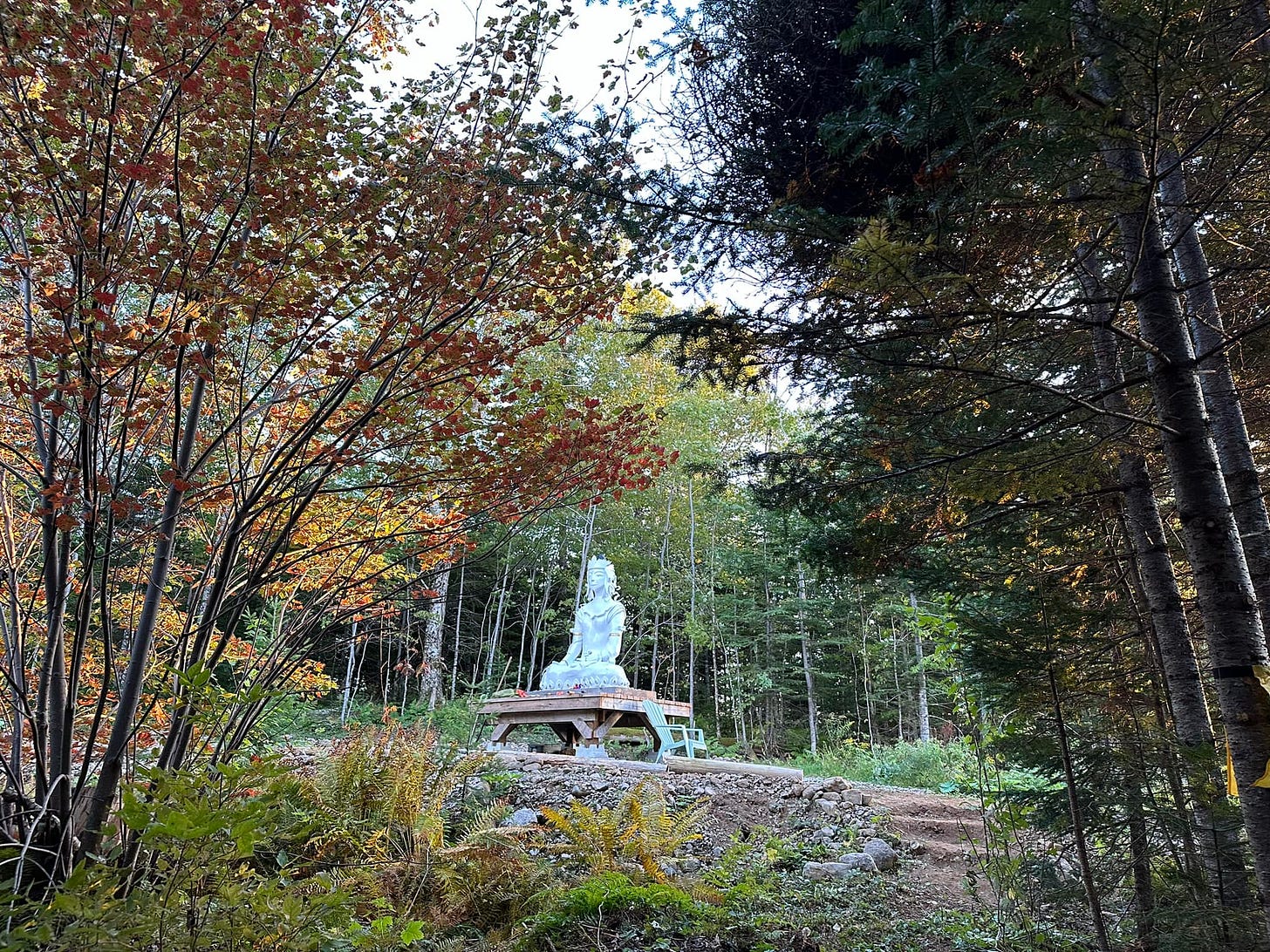There is a White Tara statue in the Canadian wilderness. It was given to my friend Jangchub Zangmo, a Buddhist nun, shortly after she donated two hundred acres of land to the Karma Kagyu Lineage of Tibetan Buddhism. Nearly ten feet tall and made of fibreglass, it took four men to carry the statue from a truck to the evergreen bower where I blessed her with incense, candles, water from my well, and yellow kale blossoms from a garden left to flower in benign neglect. Jangchub asked me for that blessing, and I was honoured that Buddhist nun had called upon a Heathen völva to lead her small community in the first acknowledgement that a goddess and Bodhisattva of her tradition had come to dwell among us.
My Invocation of White Tara
“White Tara, primordial wisdom from beginningless time, mother of all buddhas - this grove, in this forest, on this Cape Breton summer morning calls to you to come swiftly on the wind to the place prepared for you here. May this place where you are invited to dwell be flooded with the white light of your presence. May all beings who find this place be protected, healed, and blessed with long life. May all beings who find this place remember how to play. May all beings who find this place be enlightened. We of this grove consecrate this statue in this place to you, White Tara, and we call it holy.”
Formal pujas followed, year upon year, in rain, sun, or wind. Buddhist monks in saffron robes came to tell the stories of their tradition in her shadow, and my humble blessing settled with theirs into the örlog of White Tara's presence. It was comforting to imagine her there, across the narrow bridge, up the dirt road, beyond the wooded path. I wondered if animals prayed to her in the winter. When my heart was breaking over sorrows I don't care to name, and I wanted to blame myself for things beyond my control, my hugr travelled that road to ask for the gift of her infinite compassion.
In the year I took up my staff and conducted the utiseta to bless it, the same year I completed my dissertation, White Tara was moved from the donated land to Jangchub's land because her fibreglass body was cracking. So she was nearby on the cold, November night when I built a fire behind my friend's meditation cabin and made the offerings that transformed a steel tree forged for me by a blacksmith into a branch of Yggdrasil. When it was done, a white spirit thread was woven into my work, and I feel it still, holding my seiðr and my sight to their highest purpose.
Some of my Heathen colleagues are scholars of Germanic languages, literatures, and material culture, so they have a firm grasp of the differences between these academic disciplines and the sort of gnosis that drives my spiritual life. I respect that, and I've learned a great deal from them. But for my part, I hold a Folklore PhD and made a study of belief in my dissertation, so I know that our religious perspectives and practices are the product of many influences; historical, societal, environmental, familial, and personal. We can't help but vernacularize what we believe, and that's a good thing, because it means our spirituality is serving us and not the other way around.
Yes, this means that individual believers are weaving fragments of pre-Christian Germanic religion into new cloth, and that's a messy process. But it also means we condemn the burning of Gullveig for witchcraft, and we don't slut-shame Freyja. It means we respect Loki's power to queer the fuck out of a thorny problem and burn everything down if a solution doesn't present itself. It means we know the spirit of Tyr stands with all sentient beings who suffer, and we stand with them too. It means we bear witness to climate Ragnarok with our grief and our commitment to fight against it as Óðinn might; sometimes with wisdom, sometimes with eloquent speech, and sometimes out of a grim certainty that this is the only fight, the last fight, our fight.
After I graduated with my Bachelor of Celtic Studies lo, these many years ago, I remarked in my journal that "Gaelic isn't God." When I wrote that sentence, I could read and speak Irish and Scottish Gaelic, and I had a basic understanding of Medieval Welsh. But when I prayed to the Gods for the strength to finish that degree, it was in my mother tongue. Last year, I prayed in the same language for the strength to finish my PhD, and I don't think the Gods heard me any less for it. A few months ago, on another cold night in November, I went to sit with the ancestors behind Jangchub's meditation cabin. As before, White Tara sat nearby on a platform overlooking the Cape Breton hills. I paid my respects to her before I began and asked that the white spirit thread of her blessing be on my work. But it always is, so plain I can almost see it billowing from my staff, and I am somehow more Heathen for it, not less.
END
Dr. Ceallaigh S. MacCath-Moran holds B.A. in Celtic Studies from the University of Toronto, an M.A. in English and Creative Writing from the University of Maine, and a PhD in Folklore from Memorial University of Newfoundland and Labrador. She is also an author, poet, and musician under the name C.S. MacCath. Her long-running Folklore & Fiction Project integrates these passions with a focus on folklore scholarship aimed at storytellers, and she brings a deep appreciation of animism, ecology, and folkloristics to her own storytelling. Work from her two fiction and poetry collections has been shortlisted for the Washington Science Fiction Association Small Press Award, nominated for the Pushcart Prize, and nominated for the Rhysling Award. Recently, her podcast radio drama “The Belt and the Necklace,” was produced by the Odyssey Theatre in Ottawa. She has been Pagan by faith and a witch by practice for over thirty years, and in that time she has become a Druid grade member of the Order of Bards, Ovates, and Druids, a Nordic animist, and a teacher of magical traditions. She lives on Cape Breton Island with her husband, two black cats, and a giant dog. You can find her online at csmaccath.com, folkloreandfiction.com, and linktr.ee/csmaccath.







Wonderful read, thank you. I feel similarly that there are as many names and paths to God but it's with the same sentiment we all pray and honour the great mystery, whatever our language is.
I really loved this story. Thank you.